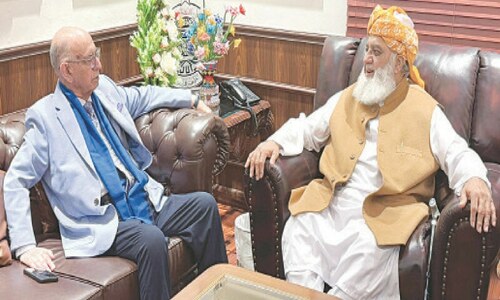ISLAMABAD, Nov 27: The United Nations Children’s Fund (Unicef) has urged the government to protect its education, health and social services budget and not to let the financial crisis confronting the country take its toll on the social sector and add to the misery of the people.
“They should not take a double hit, by cuts in social services, education and health. If anything --- in difficult times --– there should be more investment in social sectors to protect the most vulnerable children,” Unicef’s deputy executive director Hilde Frafjord Johnson told reporters on Thursday at the end of her four-day visit to Pakistan.
Ms Johnson identified difficult economic conditions, security and natural disasters as the new challenges for the country’s young citizens. The old challenges of high under-five mortality and maternal mortality, she regretted, still existed. The new and old challenges had impeded the progress of the country towards the achievement of the two millennium development goals related to child and maternal mortality.
“These factors are worsened in difficult economic times,” she said.
The financial crisis saw expenditure on basic necessities by an average Pakistani family going up by 25 per cent over the past 12 months.
The difficult economic conditions, Ms Johnson said, could have serious consequences for the poor and vulnerable children, who might be taken out of school to avoid expense, or put to work or even trafficked for income. Families, she added, could be forced to cut spending on healthcare and nutritious food, adversely affecting children’s lives.
She said she had appealed to government officials she met during her visit to increase investment in education and health – the two sectors in which Pakistan had traditionally invested less than most other developing countries.
“It is a matter of priority setting, putting the poor, the women and the children first.”
Ms Johnson said although she was encouraged by the government’s commitment in this regard, she would still like to emphasise that health, education and social services needed to be protected.
She called upon all actors in the ongoing conflict in the NWFP and tribal areas to avoid civilian deaths.
“We are deeply concerned about reports of children and civilians dying during the attacks. Military operations from all actors have an impact on the lives and livelihoods for children. We appeal to all actors to maximise efforts to avoid the deaths of innocent civilians,” she said.
She described children as the ‘silent victims’ of the ongoing conflict along the western borders of the country.
Ms Johnson pointed out that Pakistan was also seeing more people affected by natural disasters in recent years, making it all the more important to create supportive environments for getting children back to school, providing friendly and safe spaces for women and children where they could get support needed to rebuild their lives.
The official referred to the recent Balochistan earthquake in which more than half of 112,000 severely affected victims were children.
The situation, she noted, was particularly worrying because the education process of the already few children in school in the quake-hit areas had been disrupted.
“In an area where only three out of 10 girls and five out of 10 boys were attending primary school before the earthquake, 85 per cent of the children in school have seen their education disrupted,” she said.
She spoke at length about the old challenges of high under-five mortality and maternal mortality and pointed out the little progress made on these two counts.
“Even today, after a partnership spanning 60 years, Pakistani children and mothers face many difficulties.”
This year, the Unicef official said, it was estimated that more than 400,000 Pakistani children under five would die because of complications at birth, diarrhoea, respiratory infections, nutritional deficiencies and vaccine-preventable diseases. “This is unacceptable and it is a major violation of these children’s rights.”
As for mothers dying in child birth the numbers are also far too high. Thirty-six mothers die in birth a day, more than one death every hour.
“Most of these deaths are preventable if a woman gets check-ups during pregnancy and gets advice on nutrition and the importance of skilled care for a safe delivery,” she said.















































Dear visitor, the comments section is undergoing an overhaul and will return soon.